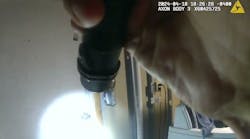John Wills, one of my colleagues here at Officer.com, has once again hit the nail squarely on the head with his current column: Good Cops Know The Value of Training: Doing for yourself when your department can't. If you haven't seen it yet, please check it out (linked below). I've been working on this article for a while, and it seems appropriate to bring it forward now. Because he made the case so eloquently, I'm going to try to build on John's premise and suggest a specific way for you to improve your firearms skills, even if your department doesn't have the time or the resources to do as much training as you, or they, would like. Check out IDPA, the International Defensive Pistol Association.
Briefly, the IDPA grew out of an older and still very active shooting sport organization, the International Practical Shooting Confederation (IPSC). IPSC was formed back in the mid 1970s, with the goal of promoting accuracy, power, and speed in practical marksmanship. After a time, some of the founding members and participants realized that, although there was plenty of accuracy and speed, the practical side was losing out to the purely competitive side. It had become a game of speed and "race guns," which were poorly suited to real world self defense. IDPA was formed in 1996, with the specific goal of promoting the use of guns and equipment that would normally be used for personal protection. As a result, the rules of the game, and yes, it is a game, were established to promote shooter skills that would be useful if they ever had to use a handgun to defend themselves.
Now, let me get this part out of the way right here. Any time you set something up as a competition, keeping time and keeping score, there will be people who try to find the slickest way to win. Sometimes you have to compromise for the sake of the game and some of the IDPA rules and practices reflect that. Not everything at a match will be strictly "real world." However, on the whole, IDPA does a pretty good job of encouraging the skills that are useful in a gunfight which is why I think it's worth your time, money and effort.
Participation in IDPA matches is an excellent way to work on improving the kind of shooting skills that you need on the street. The rules require that non law enforcement shooters use the kind of guns and gear that they can use for lawful concealed carry, including the use of an appropriate concealment garment. Police officers, on the other hand, may also use their duty gear, just as they wear it on the street. As a result, you don't have to buy anything you don't already have and you are getting practice with the tools you have at hand every day. You'll get lots of repetitions with that Level III retention holster and your magazine carrier setup. Your movements to access your equipment will become smoother and more reflexive. You'll also find out if things don't work. Using your gear under stress brings out the flaws in how you are carrying it or how you can access it.
Let's face it, there are cops out there that are more worried about how to cram all that stuff around their waist, carry it with the least amount of discomfort and still have it all look good. When the gunfight comes, none of that matters. I once saw an officer walk into a "Stop-and-Rob" where I was picking up some snacks for a class we were teaching. I naturally check out the gear that officers carry as I travel around, so I noticed that he was carrying a horizontal spare double magazine pouch. Unfortunately, he had the cover flaps pushed up against his pepper spray. Had he needed to get to the magazines in a hurry, he would have had to somehow move the OC holster out of the way! Apparently, the actual use of his gear in that configuration never crossed his mind. It would have in a gunfight.
So, IDPA matches provide a key thing: regular practice. Once most officers get out of the academy, it is up to their department to establish regular firearms training. Tight budgets and hectic schedules result in huge gaps between range sessions. Even when officers do get to the range, it is usually just to qualify. In other words, you are called upon to demonstrate proficiency with your weapon on an established course of fire. You don't really learn anything new; you just show the brass that you can hit the target the required number of times. Real skill maintenance requires much more than that. Most active IDPA clubs hold matches once a month. Some even meet weekly for mini-matches. I've attended matches at indoor ranges, where they were cramped for space, but still managed to set up three low or no-light stages.
When was the last time you worked on your low light shooting? How often do you work in low light conditions? I've shot at matches that have as many as eight stages. Each stage in an IDPA match is intended to be a representation of some real world use of force scenario. There are some limitations, of course. Concessions have to be made for range safety reasons, but still, there is always something to be learned. That's an important part of the IDPA experience. You have to think your way through the stages. In the course of a well designed match, you'll be shooting from a variety of positions, using cover appropriately, identifying appropriate targets, shooting and moving, shooting with one hand, shooting at moving targets and shooting with both speed and accuracy - all this while SAFELY handling your firearm. It is challenging and it is fun. It is also serious practice. One of the things that we use in our classes is a computer analogy. One of the more unpleasant messages we get from our computers is File Not Found. We were hoping something was there, but the computer never had any input on the subject, hence it has no output when you need it. It is the same with your on-board computer: the standard issue brain.
If you have been exposed to something, in theory, or better yet, in practice, your brain should find that file when you need it. In the midst of a fight for your life is not the time for your brain to respond File Not Found. Who knows what stage in an IDPA match may one day be the one that triggers the realization: "Hey, I've seen this before. I can handle this!" In addition, how many of you get to practice on a range where you can draw smoothly, move and shoot quickly, reload rapidly and get immediate feedback about how well you are doing all of these things? A colleague of mine, Chris Christian, made an excellent point during a recent podcast we were recording. If you did those things at most ranges, you'd get thrown out. Many ranges don't allow moving, working from a holster, or so-called "rapid fire." Such things only happen at the matches, so that's where you need to be.
At the monthly shoots I regularly attend, the First Coast IDPA Match Director, Dr. Ed Sevetz, is a firearms instructor for a local county sheriff's department. Out of a typical match attendance of 60 to 70 people, we usually only see a handful of cops. I asked Ed, and also a retired colleague of his (who was also a firearms instructor and special teams member) why we don't see more cops at matches. Well, time and money were certainly a factor, but we agreed on one reason that should give us all pause: the cops don't want to embarrass themselves. Yep, that's it: Ego. Many cops realize that their skills aren't what they ought to be. They also realize that there are ordinary citizens out there who are better gun handlers than they are. That's a tough one to swallow, being that the police are supposed to be the gun pros.
Folks, for your own sake, as well as the people of your community, suck it up, check your ego at the door and go improve yourselves. I know of one officer who is an outstanding shooter and a firearms instructor for his very large state agency. He never finds time to go to a match. His father attends almost every month. His brother, who is with another state-wide agency, makes it as often as his schedule allows. He's a good shooter also, and he always has a great time. In fact, I think it's an eye opener for a lot of cops who do make the effort when they realize that there are a lot of really good people out there with guns. They take their training seriously and have an excellent appreciation for the tough job that the police have to do every day.
So, how do you make this happen? Here are some suggestions. Begin by finding out if there is a local IDPA club in your area. The web link to the national IDPA website is below. That will lead you to local clubs. If not, ask around at your local gun shops and shooting clubs. Then make a commitment to go to a match and give it a try. Better yet, get a department team together and go. Show the department colors, as it were. Maybe you can get the department to kick in the ammo or the ride to get there. Bring back the scores or copy the match results for your files. Take some pictures at the match, write up an article and submit it to the sports section of your local newspaper. Even the papers that are usually neurotic about guns realize that the cops have to carry and use them. They might just welcome an article about how well you do that. Your department can benefit from the positive publicity and maybe even get some community backing to help with the expenses. If nothing else, you'll be getting lots of great practice, meeting some really good people (for a change) and probably make friends for yourselves and your agency. It is an outstanding opportunity in many respects, but most importantly, it will make you better at skills you might need on the street. I can't think of a better way to spend a few training hours every month. I look forward to see you there!



